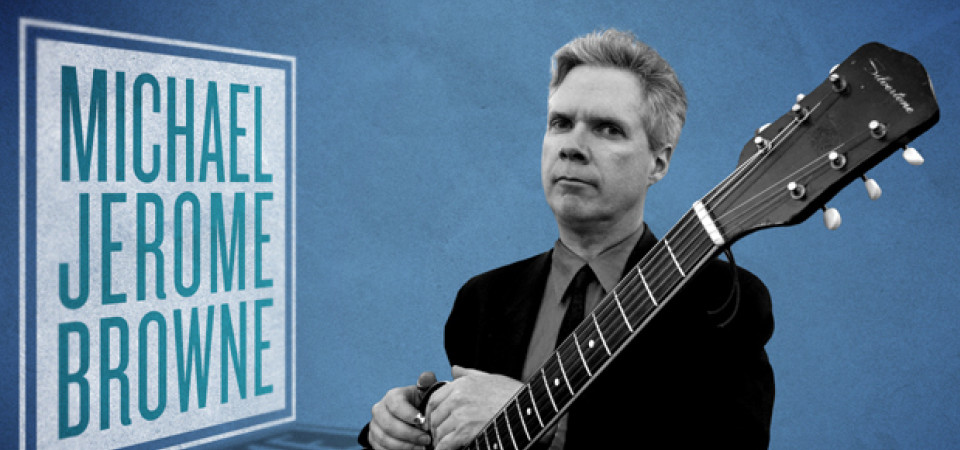 Wednesday April 30, 2014: DAVID FRANCEY. “One of Canada’s most revered folk poets and singers”, David is a multiple Juno winner who performed in Cranbrook some years back. This is a fitting finale for the series.
Wednesday April 30, 2014: DAVID FRANCEY. “One of Canada’s most revered folk poets and singers”, David is a multiple Juno winner who performed in Cranbrook some years back. This is a fitting finale for the series.&&&&&&&&&&&&&&&

 Wednesday April 30, 2014: DAVID FRANCEY. “One of Canada’s most revered folk poets and singers”, David is a multiple Juno winner who performed in Cranbrook some years back. This is a fitting finale for the series.
Wednesday April 30, 2014: DAVID FRANCEY. “One of Canada’s most revered folk poets and singers”, David is a multiple Juno winner who performed in Cranbrook some years back. This is a fitting finale for the series.&&&&&&&&&&&&&&&
“ONE OF THE MOST IMPORTANT ASPECTS OF LEARNING ANYTHING IS MAKING SURE YOU REALLY KNOW THE MELODY YOU’RE WORKING WITH. IF THERE’S A FAULT WITH MODERN MUSIC, IT’S THAT PEOPLE AREN’T REALLY VERY GOOD AT TUNES – I DON’T HEAR GREAT MELODIES VERY OFTEN. I REALLY DESPAIR THE LACK OF MELODY IN MOST MODERN GUITAR PLAYING, SO I AVOID IT, TO BE HONEST. BUT IF YOU WORK WITH TRADITIONAL MUSIC, OR THE WORK OF THE BEST SONG WRITERS, THE BOTTOM LINE IS YOU HAVE THIS BEAUTIFUL TUNE, AND YOU HAD BETTER TRY AND DO IT JUSTICE.” Acoustic Guitar, March 2014.
[Martin Stewart Simpson (born 5 May 1953) is an English folk singer, guitarist and songwriter. His music reflects a wide variety of influences and styles, rooted in Britain, Ireland, America and beyond. He has been nominated 23 times in the 11 years of the BBC Radio 2 Folk Awards, including nine times consecutively as Artist of The Year, which he has won twice. His album Prodigal Son was named album of the year in 2008 and a song from that album, “Never Any Good” was named best original song of the year. Martin Simpson is regarded by many as one of the most skilled folk guitarists currently playing on the British and American folk scene – Wikipedia. Martin Simpson lived in the US for a number of years and in his travels from Santa Cruz to Edmonton he stopped in a number of times in Cranbrook and performed a number of memorable solo concerts at the Studio / Stage Door.]
 There, somebody has finally said it – nobody really knows how to play melodies any more. There is a reason for this and I’m not just hankering after the good old days. In the Swing Era and before, instrumental music was the predominate mode of expression and the primary melodic instruments in pop music were trumpets, sax, trombones, etc. Somewhere around the 1950’s pop music went into a transition and things started to change. The major melodic instruments had retreated from popular music into the esoteric world of Jazz and Be-bop. Now, apart from the occasional horn section, the major melodic instruments are mostly absent from pop music. The crooners and popular singer/songwriter have moved to center stage. By the time Bob Dylan and his colleagues had finished exerting their influence the song had become king in popular music. But there is a difference from the golden days of ‘tin-pan alley’ pop songs. Moon, spoon and June are no longer the primary lyrical motifs. Songs had moved into the realm of politics and personal statement. Lyricists and tune writers no longer work in tandem. The usual mode of creation has become the almost sole preserve of the singer/songwriter. And, as near as I can tell, the creative process, seems to revolve around the lyrics. The words come first and the melody and harmony arrive later. Nobody seems to write and harmonize a great melody then attach lyrics. The net result is that writing good strong melodies is secondary. Of course there were (are) exceptions. The Beatles being the most notable. Melodic expression comes in the form of instrumental solos inserted in the performance. The only problem with that, despite some magnificent exceptions, is that the solos tend to become fairly generic. A kind of one size fits all. Music has become more and more predictable and is basically the servant of the commercial world. It is now an “industry”. Musicians are notoriously conservative and none more so than your average rock/pop musician. The old image of the outlaw anti-establishment rock musician is basically a myth. When pop music is used to sell everything from toothpaste to automobiles it is hardly rebelling against anything. It is basically the servant of the commercial world. When was the last time you heard pop music that was really interesting? Nobody is really taking any musical risks anymore. We all know that revolution and rebellion are the life blood of change and pop music is in need of a significant change. There are a wealth of melodies (old and new), rhythms, harmony, styles and even pure noise (long live John Cage) out there that could rejuvenate the popular musical world. So let the revolution begin.
There, somebody has finally said it – nobody really knows how to play melodies any more. There is a reason for this and I’m not just hankering after the good old days. In the Swing Era and before, instrumental music was the predominate mode of expression and the primary melodic instruments in pop music were trumpets, sax, trombones, etc. Somewhere around the 1950’s pop music went into a transition and things started to change. The major melodic instruments had retreated from popular music into the esoteric world of Jazz and Be-bop. Now, apart from the occasional horn section, the major melodic instruments are mostly absent from pop music. The crooners and popular singer/songwriter have moved to center stage. By the time Bob Dylan and his colleagues had finished exerting their influence the song had become king in popular music. But there is a difference from the golden days of ‘tin-pan alley’ pop songs. Moon, spoon and June are no longer the primary lyrical motifs. Songs had moved into the realm of politics and personal statement. Lyricists and tune writers no longer work in tandem. The usual mode of creation has become the almost sole preserve of the singer/songwriter. And, as near as I can tell, the creative process, seems to revolve around the lyrics. The words come first and the melody and harmony arrive later. Nobody seems to write and harmonize a great melody then attach lyrics. The net result is that writing good strong melodies is secondary. Of course there were (are) exceptions. The Beatles being the most notable. Melodic expression comes in the form of instrumental solos inserted in the performance. The only problem with that, despite some magnificent exceptions, is that the solos tend to become fairly generic. A kind of one size fits all. Music has become more and more predictable and is basically the servant of the commercial world. It is now an “industry”. Musicians are notoriously conservative and none more so than your average rock/pop musician. The old image of the outlaw anti-establishment rock musician is basically a myth. When pop music is used to sell everything from toothpaste to automobiles it is hardly rebelling against anything. It is basically the servant of the commercial world. When was the last time you heard pop music that was really interesting? Nobody is really taking any musical risks anymore. We all know that revolution and rebellion are the life blood of change and pop music is in need of a significant change. There are a wealth of melodies (old and new), rhythms, harmony, styles and even pure noise (long live John Cage) out there that could rejuvenate the popular musical world. So let the revolution begin.
@@@@@@@@@@@@
Geoff Berner at Lotus Books, February 8, 2014, 8pm. Check Geoff’s website at Geoff Berner and also Youtube video Play, Gypsy, Play. Also his wikipedia entry Geoff Berner wikipedia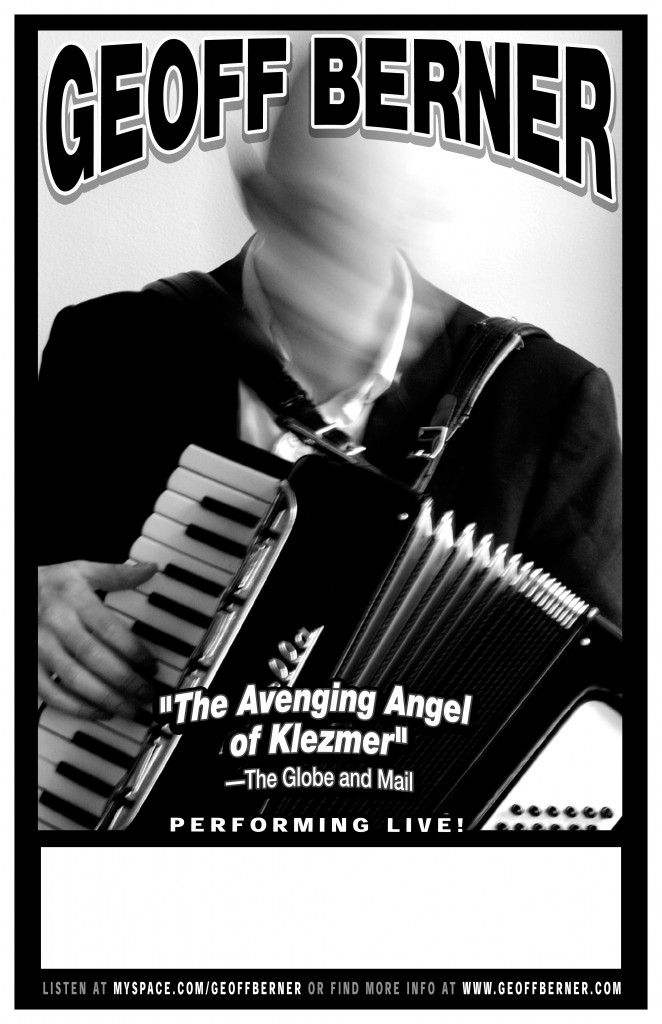 “Geoff Berner (born in Vancouver 197) is a Canadian singer-songwriter and accordion player from Vancouver, British Columbia. Due to his insightful humour, politically inflammatory compositions and showmanship, Berner has gained a cult following over
“Geoff Berner (born in Vancouver 197) is a Canadian singer-songwriter and accordion player from Vancouver, British Columbia. Due to his insightful humour, politically inflammatory compositions and showmanship, Berner has gained a cult following over 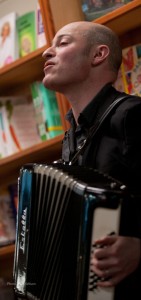 the years, especially in Canada and Norway, where he recorded his first live album, Live in Oslo (2004)………” – Wikipedia entry.
the years, especially in Canada and Norway, where he recorded his first live album, Live in Oslo (2004)………” – Wikipedia entry.
The “show” at Lotus Books was as much a literary event as a musical performance. Although he is labelled as a singer / songwriter, with the publication of his novel Festival Man last October, he has also established his literary credentials. He is a more than a step away from the run-of-the-mill guitar totting songster. His performance, although in no way manic, lives up to “a wild combination of menace, madness, and genius… .” – Vue Weekly, Edmonton. His music has been described as “new Jewish drinking songs” or “Klezmer Punk” but despite some Jewish elements in the music I don’t think Klezmer is a good descriptor. Maybe, when people see the accordion they feel the need to apply some sort of ethnic label to give the music a specific dimension. Rather, I think his music is more geocentric than ethnocentric. By that I mean his music comes specifically out of the politics and geography of his home base, Vancouver. His interpretations of that milieu , while personal, definitely have universal applications. His The Official Theme Song of the 2010 Winter Olympics with its somewhat chilling chorus “the dead children were worth it” expresses a sick notion that continues to be played out when ever big sport events displace priorities (and money) away from the public good. The song That’s What Keeps the Rent Down Baby is another edgy piece that could easily be associated with the East Hasting Street area of Vancouver Youtube version. Something with more of a Jewish overtone would be the Russian song Dalloy Polizei (literal translation “Fuck the Police”) Youtube Version of Dalloy Polizei . Interspersed though out the evening were several readings by Geoff and Ferdy Belland from Geoff’s novel Festival Man. Ferdy was in his best “Papa” Hemingway mode. Here are some images from the evening. 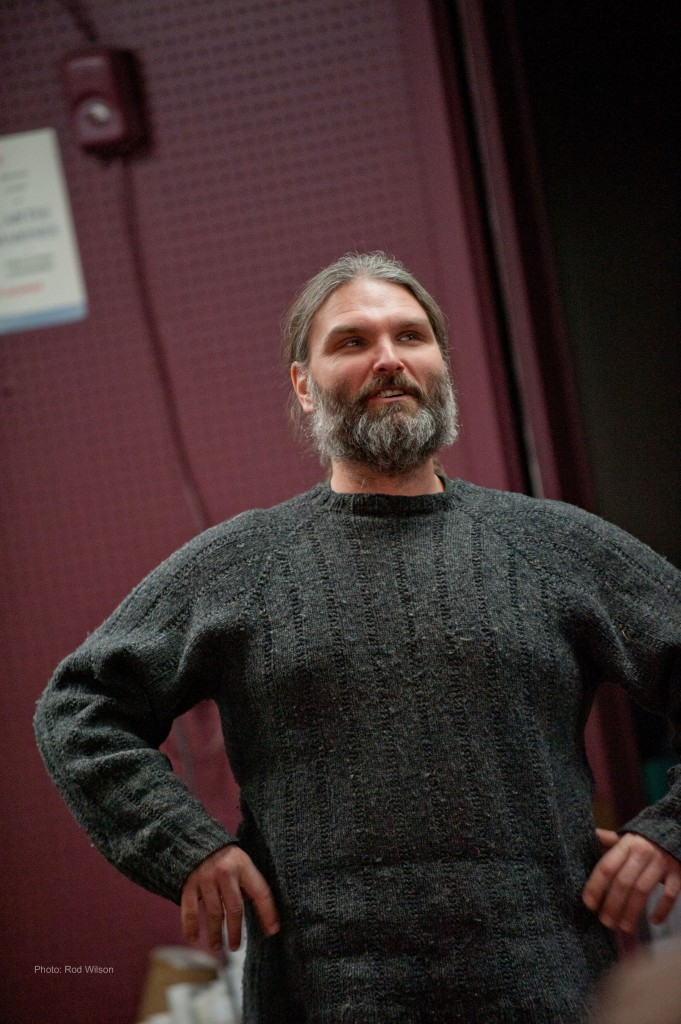
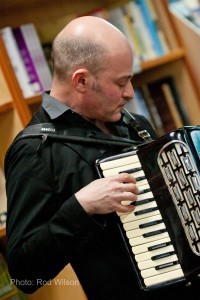
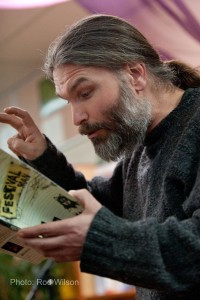
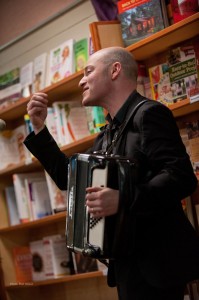
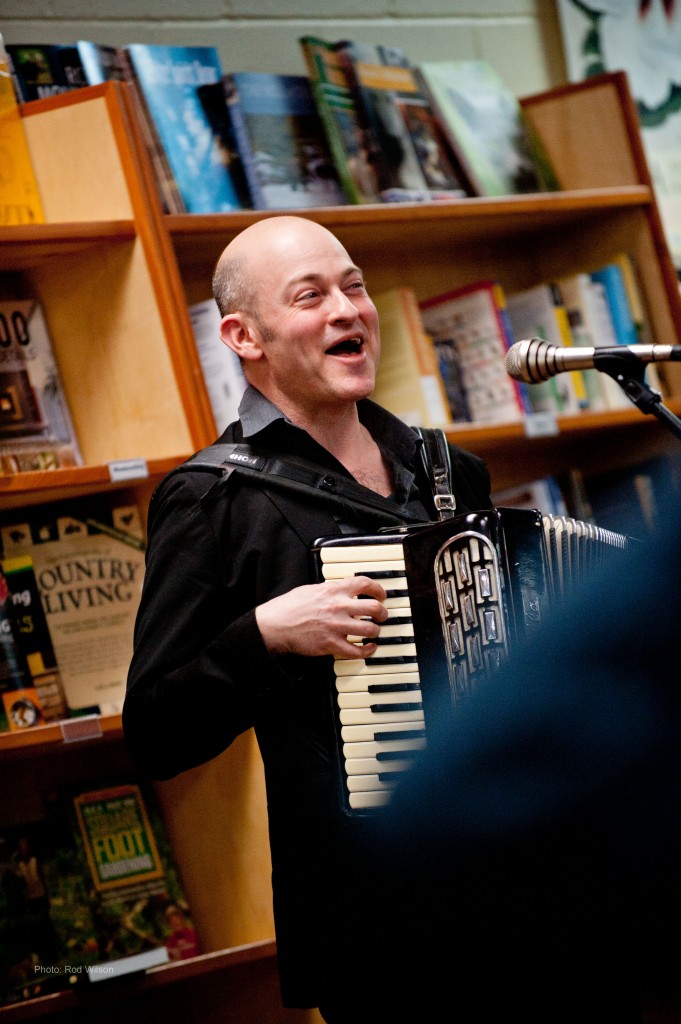
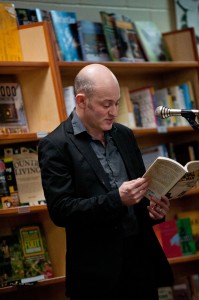
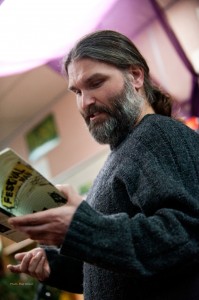
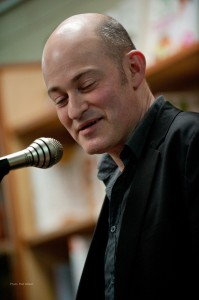
This was a more than pleasant evening spent in the intimate confines of The Lotus Book Store listening to a unique performance . Thanks should got to Geoff Berner for his unique brand of music and satire and his low keyed accordion playing. Also, of course, thanks to Ferdy and Erin for bringing Geoff to the bookshop. Please also note that the novel Festival Man is available from the Lotus Bookshop.
@@@@@@@@@@
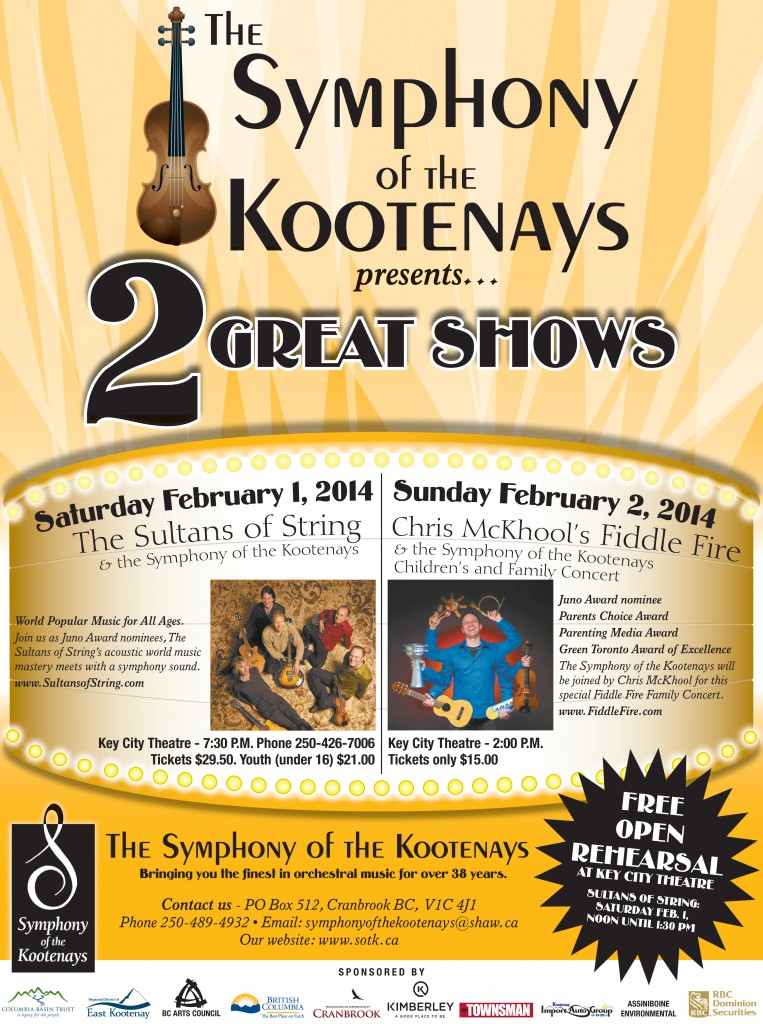 Symphony of the Kootenays and the Sultans of String rehearsals, Key City Theatre, February 1, 12 noon, February 1, 2014.
Symphony of the Kootenays and the Sultans of String rehearsals, Key City Theatre, February 1, 12 noon, February 1, 2014.
” And then the man, he steps right up to the microphone.
And says at last, just as the time bell rings,
“Goodnight, now it’s time to go home.”
And he makes it fast, with one more thing:
“We’re the Sultans,
“We are the Sultans of Swing.” Songwriter: KNOPFLER, MARK
Mind you there is no connection between the Dire Straight album and the Symphony of the Kootenays concert. There is just the resonance of the song title and the name of the 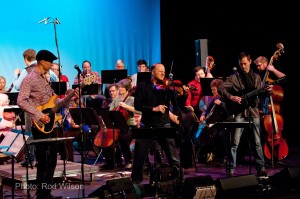 symphony orchestra guests – THE SULTANS OF STRING – that has so much appeal. Dire Straights was a rock band singing about musicians from another era. The Sultans are not about rock music. Their musical arena is more about a whole mixed bag of World music, Latin, Gypsy, Swing etc.
symphony orchestra guests – THE SULTANS OF STRING – that has so much appeal. Dire Straights was a rock band singing about musicians from another era. The Sultans are not about rock music. Their musical arena is more about a whole mixed bag of World music, Latin, Gypsy, Swing etc. 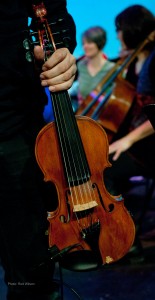 The Sultans of String are Chris McKhool (6 string violin, mandolin), Drew Birston (electric bass),
The Sultans of String are Chris McKhool (6 string violin, mandolin), Drew Birston (electric bass),  Kevin Laliberte (carbon-fibre guitar) and Alberto Suarez (percussion). This rehearsal was the fore runner of what promised to be a very unique night of music. Unfortunately I was double booked (again) and not able to make the Saturday night concert. However, I did make the afternoon rehearsals and the Sunday Fiddle Fire (concert for kids). It was pretty exciting and entertaining stuff to hear the Symphony exploring a whole new approach to making music. The music is the brain child of Chris McKhool and Kevin Laliberte
Kevin Laliberte (carbon-fibre guitar) and Alberto Suarez (percussion). This rehearsal was the fore runner of what promised to be a very unique night of music. Unfortunately I was double booked (again) and not able to make the Saturday night concert. However, I did make the afternoon rehearsals and the Sunday Fiddle Fire (concert for kids). It was pretty exciting and entertaining stuff to hear the Symphony exploring a whole new approach to making music. The music is the brain child of Chris McKhool and Kevin Laliberte  with orchestrations by Rebecca Pellett. Although the rehearsal didn’t present the music in a program coherent form there were enough snippets to entice the visiting rehearsal audience to maybe come back later that evening for the full concert. For me there were a number of outstanding moments. In the exploration of the mandolin the unexpected and joyous snippet from a Vivaldi mandolin concerto was so amazingly fresh and startling that it certainly made me sit
with orchestrations by Rebecca Pellett. Although the rehearsal didn’t present the music in a program coherent form there were enough snippets to entice the visiting rehearsal audience to maybe come back later that evening for the full concert. For me there were a number of outstanding moments. In the exploration of the mandolin the unexpected and joyous snippet from a Vivaldi mandolin concerto was so amazingly fresh and startling that it certainly made me sit 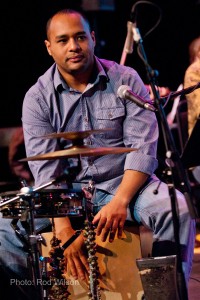 up. Kevin Laliberte’s guitar solos were some other high points. His Carbon-Fibre guitar, with it’s odd shape, looked way different from a conventional classical guitar yet, despite the on-board amplification, produced, when required, a pure classical sound. It also appeared to be amendable to the sound manipulation that we associate with most electric guitars. His technique ran though the whole spectrum of guitar music – flat pick, finger picking, classical, jazz, flamenco etc. Drew Birston’s electric bass is, obviously, a central part of the Sultan’s Sound and added a different bass dimension (pizzicato bass melody) to the orchestrations. Being an amateur musician who tinkers with percussion I was completely captivated by the Cuban musician Alberto Suarez’s rhythmic excursions on the Peruvian Cojon (basically a wooden box), snare drum, brushes, cymbals, rattles and the middle eastern Darbuka (Turkish Goblet drum). His role in the music was re-enforced by the symphony percussionists Robin Clegg, Sven Heyde and Bruce Hunter. Their arsenal of drums and percussion would be enough to fill your average basement. The Sultans of String were obviously having fun playing with a symphony and the orchestra pit was just a sea of smiling faces. I am sure the evening concert lived up to the promise of the rehearsals. Here are some more images from the rehearsal – enjoy:
up. Kevin Laliberte’s guitar solos were some other high points. His Carbon-Fibre guitar, with it’s odd shape, looked way different from a conventional classical guitar yet, despite the on-board amplification, produced, when required, a pure classical sound. It also appeared to be amendable to the sound manipulation that we associate with most electric guitars. His technique ran though the whole spectrum of guitar music – flat pick, finger picking, classical, jazz, flamenco etc. Drew Birston’s electric bass is, obviously, a central part of the Sultan’s Sound and added a different bass dimension (pizzicato bass melody) to the orchestrations. Being an amateur musician who tinkers with percussion I was completely captivated by the Cuban musician Alberto Suarez’s rhythmic excursions on the Peruvian Cojon (basically a wooden box), snare drum, brushes, cymbals, rattles and the middle eastern Darbuka (Turkish Goblet drum). His role in the music was re-enforced by the symphony percussionists Robin Clegg, Sven Heyde and Bruce Hunter. Their arsenal of drums and percussion would be enough to fill your average basement. The Sultans of String were obviously having fun playing with a symphony and the orchestra pit was just a sea of smiling faces. I am sure the evening concert lived up to the promise of the rehearsals. Here are some more images from the rehearsal – enjoy:
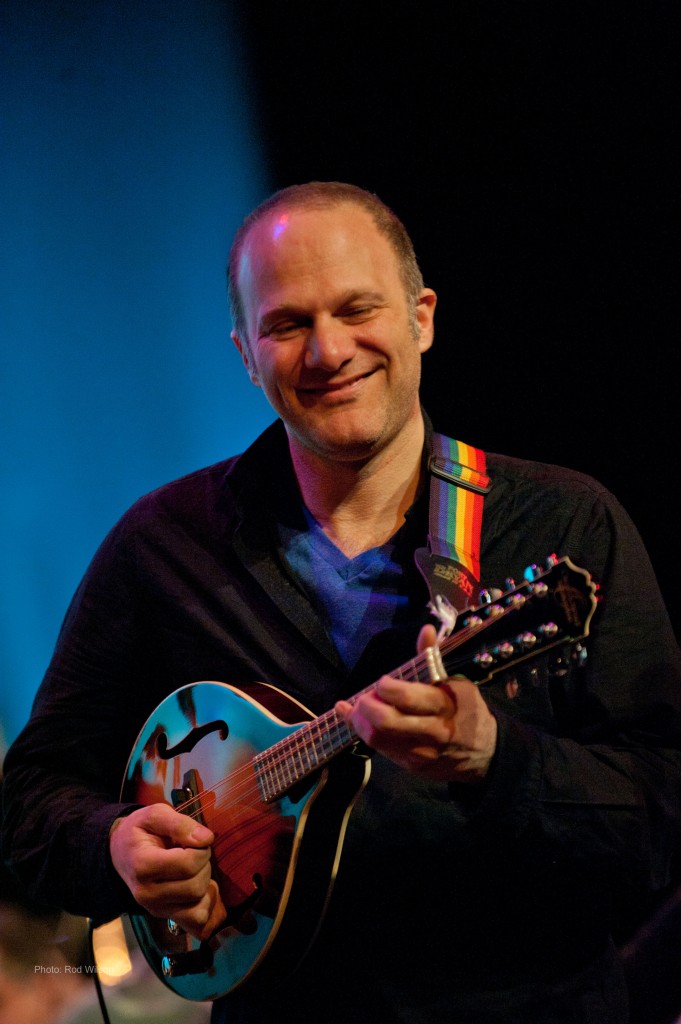
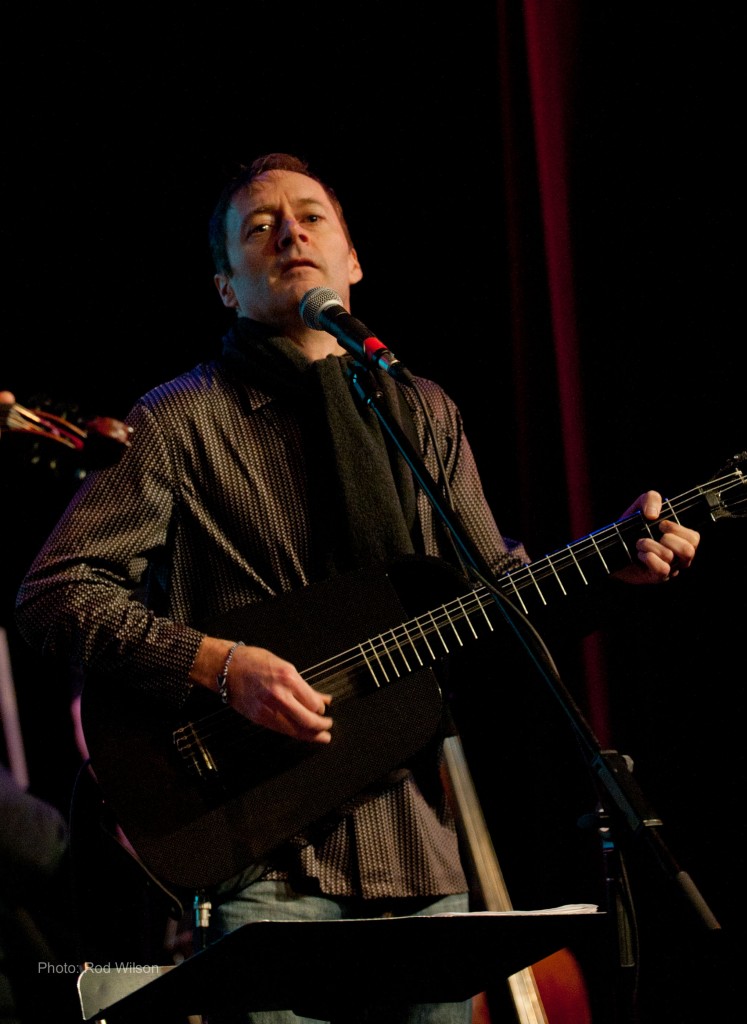
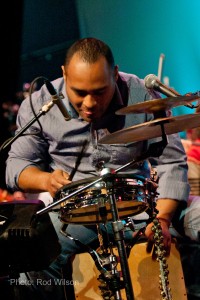
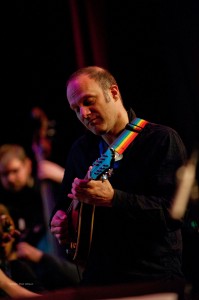
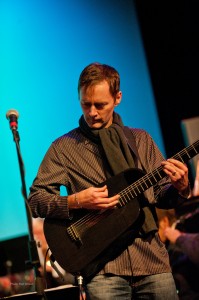
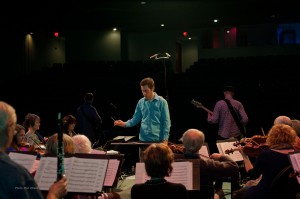
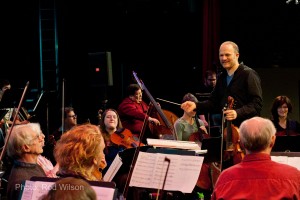
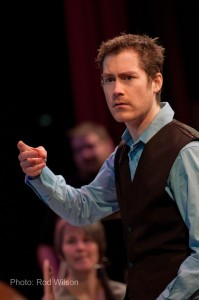
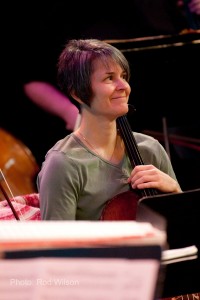
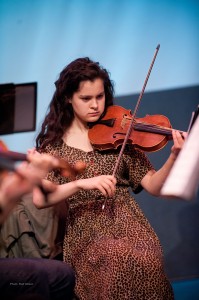
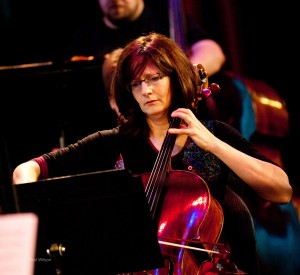
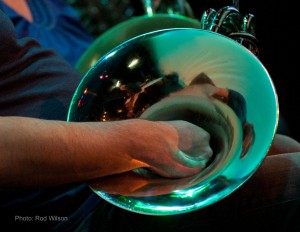
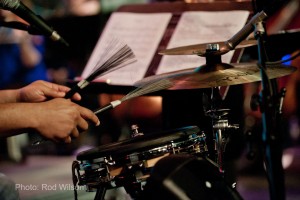

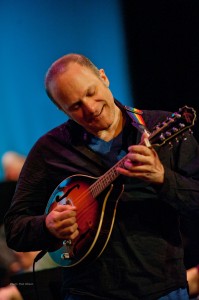
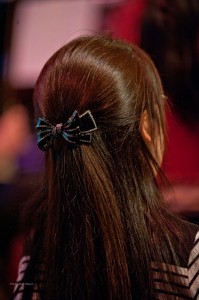
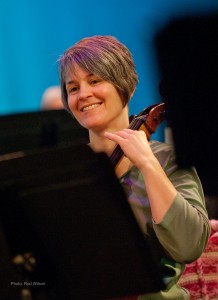
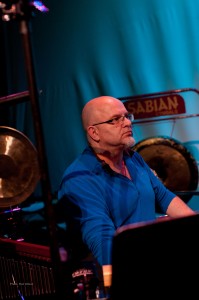
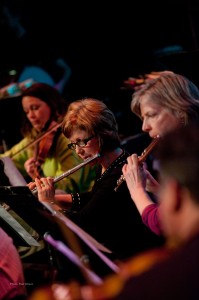
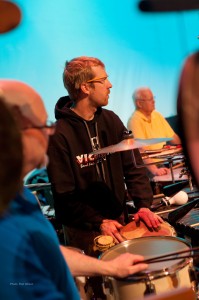
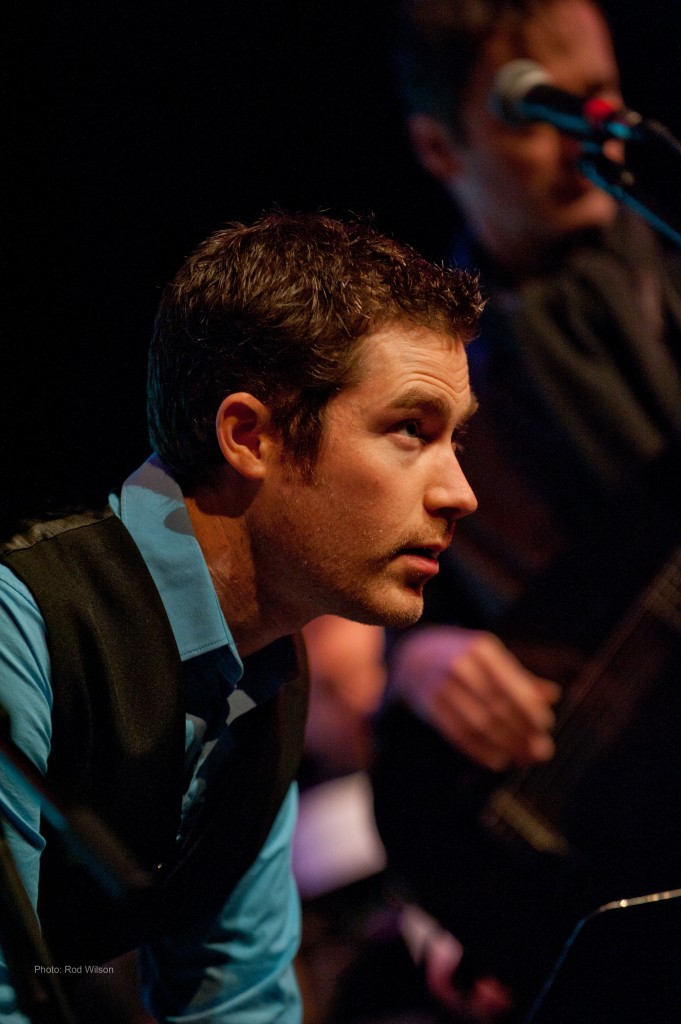
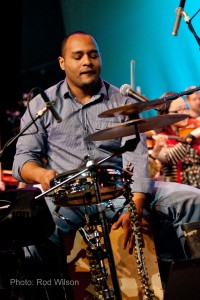
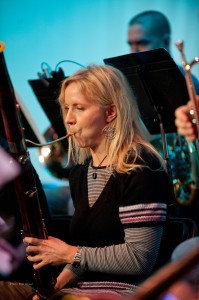
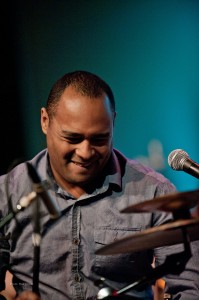
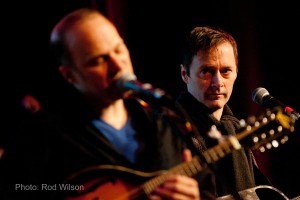
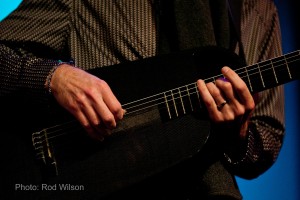
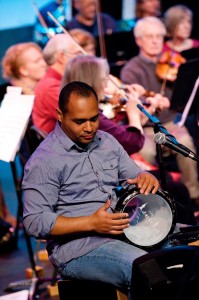
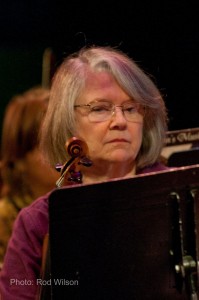
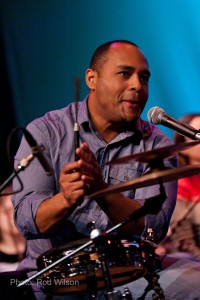
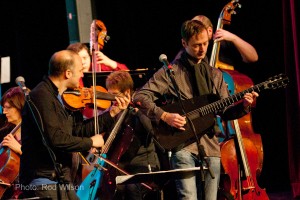 Chris McKhool’s Fiddle Fire, Key City Theatre Sunday February 2, 2014, 2pm.
Chris McKhool’s Fiddle Fire, Key City Theatre Sunday February 2, 2014, 2pm.
 These three musicians are definitely CFAs (“Come from Away”). The fact they kept their outside jackets on for the sound check should have been the first clue. Anja McCloskey (vocals, pianio and accordion) is a German American girl originally from Des
These three musicians are definitely CFAs (“Come from Away”). The fact they kept their outside jackets on for the sound check should have been the first clue. Anja McCloskey (vocals, pianio and accordion) is a German American girl originally from Des 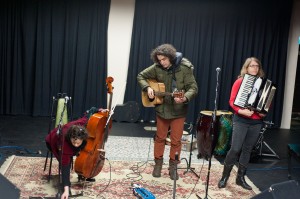 Moines, Iowa, now resident in Hamburg Germany; Dan Whitehouse (vocals and guitar) is a singer song writer from Birmingham; Hannah Moulette (cello, vocals and guitar) is from Sommerset, England. How these three CFAs originally got together is probably a story worth telling but it suffices to say that this tour was probably thrown together on a whim. Anja has a brother in Vancouver and the only way she could make the trip was to tie it in with a concert tour. So she trolled through her musical friends and managed to line up Dan and, at the last minute, Hannah to commit to an off the cuff tour of Canada in ……. January!! What were they thinking? They say ignorance is bliss and it could not be more true than in this case. They landed in Canada, rented a cello and guitar for fifty bucks, borrowed
Moines, Iowa, now resident in Hamburg Germany; Dan Whitehouse (vocals and guitar) is a singer song writer from Birmingham; Hannah Moulette (cello, vocals and guitar) is from Sommerset, England. How these three CFAs originally got together is probably a story worth telling but it suffices to say that this tour was probably thrown together on a whim. Anja has a brother in Vancouver and the only way she could make the trip was to tie it in with a concert tour. So she trolled through her musical friends and managed to line up Dan and, at the last minute, Hannah to commit to an off the cuff tour of Canada in ……. January!! What were they thinking? They say ignorance is bliss and it could not be more true than in this case. They landed in Canada, rented a cello and guitar for fifty bucks, borrowed 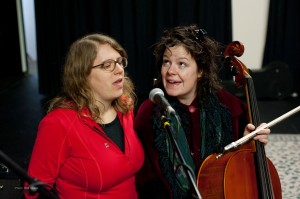 an accordion, rented a vehicle with all- season radials and hit the road. On mentioning the all-season radials you could hear an almost inaudible gasp from the audience. So far they have been to Banff, Calgary, Pincher Creek, Kimberley and are heading further west for the rest of the tour – snow, ice and avalanches be dammed. So far no problems. As I said “ignorance is bliss”. Appropriately, Hannah and Anja kicked off their portion of the evening with Songbird, a charming vocal duet about traveling. Hannah, with her impish looks and demeanor could have stepped out of a J.R.R.Tolkein novel. The red cape picked up at thrift store en route
an accordion, rented a vehicle with all- season radials and hit the road. On mentioning the all-season radials you could hear an almost inaudible gasp from the audience. So far they have been to Banff, Calgary, Pincher Creek, Kimberley and are heading further west for the rest of the tour – snow, ice and avalanches be dammed. So far no problems. As I said “ignorance is bliss”. Appropriately, Hannah and Anja kicked off their portion of the evening with Songbird, a charming vocal duet about traveling. Hannah, with her impish looks and demeanor could have stepped out of a J.R.R.Tolkein novel. The red cape picked up at thrift store en route 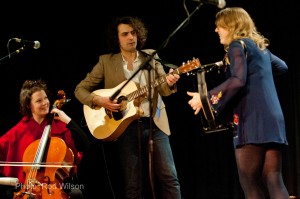 was an inspired touch. The on stage persona she projected well suited her musical style. Hannah continued the show with a number of solo pieces that included The Night is Young (“and there is plenty of rum”), Devil of Mine, Circle Song, and Blood and Thunder. Anja returned to the stage for an accordion/cello instrumental entitled Seven and continued with Too Many Words, Italian Song, and, with piano accompaniment, Cross the Seas. The trio, Dan, Hannah and Anja, came together for The Calm and Instigated. The final selections of the evening featured Dan’s songs including A Light, The Fire of Lust (“an Ode to Testosterone”), Three Bodies (about tourist photographs), Born to Run, Somebody Loves You, Sleeping and probably the strongest song of the evening Why Don’t We Dance. That last mentioned song deserves a view of the YouTube version. Here are some images from an evening of music that was definitely “outside the box”.
was an inspired touch. The on stage persona she projected well suited her musical style. Hannah continued the show with a number of solo pieces that included The Night is Young (“and there is plenty of rum”), Devil of Mine, Circle Song, and Blood and Thunder. Anja returned to the stage for an accordion/cello instrumental entitled Seven and continued with Too Many Words, Italian Song, and, with piano accompaniment, Cross the Seas. The trio, Dan, Hannah and Anja, came together for The Calm and Instigated. The final selections of the evening featured Dan’s songs including A Light, The Fire of Lust (“an Ode to Testosterone”), Three Bodies (about tourist photographs), Born to Run, Somebody Loves You, Sleeping and probably the strongest song of the evening Why Don’t We Dance. That last mentioned song deserves a view of the YouTube version. Here are some images from an evening of music that was definitely “outside the box”.
Special thanks should go to the opening act Daze of Grace (Sharon Routley, Jubal Routley and guest percussionist, yours truly, Rod Wilson); sound techs Ray and Marty; Terry on lights; the MC Keith Nicholas, and all the staff and volunteers of the Kimberley Arts Council. Also extra special thanks should go to the corporate sponsors The Burrito Grill for feeding the musicians and Mountain Spirits for provide accommodation for the CFA musicians.
@@@@@@@@@@@@@
“Peter “Pete” Seeger (May 3, 1919 – January 27, 2014) was an American folk singer and left-wing activist. A fixture on nationwide radio in the 1940s, he also had a string of hit records during the early 1950s as a member of the Weavers, most notably their recording of Lead Belly‘s “Goodnight, Irene“, which topped the charts for 13 weeks in 1950. Members of the Weavers were blacklisted during the McCarthy Era. In the 1960s, he re-emerged on the public scene as a prominent singer of protest music in support of international disarmament, civil rights, counterculture and environmental causes.” (wikipedia entry). He died peacefully in his sleep January 27,2014. He survived his wife of 75 years by a mere 6 months. There will never be another like him or at least that is the wish of most right wing reactionaries.
I was fortune to be able to hear Peter Seeger live in Australia in 1963 at a concert held at Sydney University. Because of his left wing views Seeger had been prevented from leaving the USA (“land of the free”) to tour and, I suspect, the Australian tour was one of his first appearances outside the USA. I am not one to be celebrity struck but that concert left an indelible mark on my memory. Pete strode onto the stage with a banjo in one hand and a 12 string guitar in the other. With only his voice and those two props he gave us a memorable night of mostly traditional songs and counter culture attitudes. It was a portrait of an America that we hardly knew. Before that concert I had never heard banjo played that way; nor seen a 12 string guitar; and I had never heard of Huddie Leadbetter (Leadbelly). Since that time I have not heard a performance that matched the one on that night. The nearest I have come to it was the concert by Chris Coole at the Clawhammer in Fernie a year or so ago. The wikipedia entry suggests that the Peter Seeger tour initiated a folk boom in Australia and was responsible for the explosion in folk clubs and folk music in general in Australia. I would contest that notion. I further suggest that the Seeger tour was a response to an already significant ground swell of traditional music, and specifically Australian folk music, that was well under way prior to the tour. I suspect the folk boom got under way in Australia because of the influence of the new British immigrants to the country who were already well versed in traditional music back in the old country. Be-that-as-it-may, I am forever thankful for the concert and the life of Pete Seeger.
@@@@@@@@@@@@@
Two One Act plays at the Studio / Stage Door: rehearsal Wednesday, January 22, 2014, 8pm.
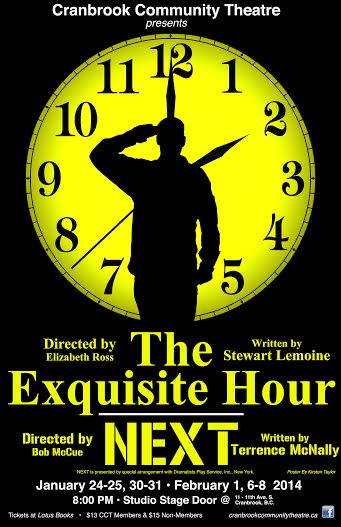 The Exquisite Hour – A one act play written by Edmonton playwright Stewart Lamoine (hurrah for Canadian content), Directed by Elizabeth Ross, staring Jennifer Inglis as Helen Darimont and Patrick Baranowski as Zachary Teale.
The Exquisite Hour – A one act play written by Edmonton playwright Stewart Lamoine (hurrah for Canadian content), Directed by Elizabeth Ross, staring Jennifer Inglis as Helen Darimont and Patrick Baranowski as Zachary Teale.
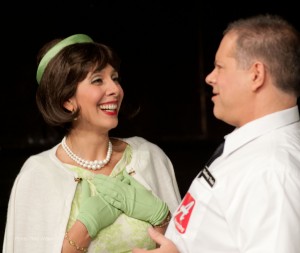 “He’s a big galoot” ! It is an expression that probably goes way back to the days of Mark Twain and it is a perfect descriptor for Zachary Teale. It is usually meant to describe some one who is socially awkward and clumsy. It’s not usually meant to be malicious. In in an appropriate context, such as in this play, it can be term of endearment. Helen Darimont probably thinks of Zachhary Teale as a “big loveable Galoot”. Helen Darimont is a kind of Patti Page / Doris Day character straight out of a 1950’s TV sit-com. The setting of the play and the musical prelude to the play re-enforces that Dejavu notion. It appears to be set in the days when ladies wore dresses and colored co-ordinated ensembles. It is a tale of infatuation and shyness. Helen poses as a door-to-door encyclopaedia sales man (sorry, sales person) and, in developing a sales-pitch rapport, proceeds to smooth away some of Zachary’s social awkwardness. The play is nicely paced as the characters, with some humor, navigate their way to a point when all is revealed. They are not exactly perfect strangers after all. The cast is perfect; Jennifer Inglis looks and acts like she is straight out of a 1950’s sit-com; Patrick Baranowski has the right amount of awkwardness for the character he portrays. This is a play well worth giving up a night of television hockey. Here are some more images from the play:
“He’s a big galoot” ! It is an expression that probably goes way back to the days of Mark Twain and it is a perfect descriptor for Zachary Teale. It is usually meant to describe some one who is socially awkward and clumsy. It’s not usually meant to be malicious. In in an appropriate context, such as in this play, it can be term of endearment. Helen Darimont probably thinks of Zachhary Teale as a “big loveable Galoot”. Helen Darimont is a kind of Patti Page / Doris Day character straight out of a 1950’s TV sit-com. The setting of the play and the musical prelude to the play re-enforces that Dejavu notion. It appears to be set in the days when ladies wore dresses and colored co-ordinated ensembles. It is a tale of infatuation and shyness. Helen poses as a door-to-door encyclopaedia sales man (sorry, sales person) and, in developing a sales-pitch rapport, proceeds to smooth away some of Zachary’s social awkwardness. The play is nicely paced as the characters, with some humor, navigate their way to a point when all is revealed. They are not exactly perfect strangers after all. The cast is perfect; Jennifer Inglis looks and acts like she is straight out of a 1950’s sit-com; Patrick Baranowski has the right amount of awkwardness for the character he portrays. This is a play well worth giving up a night of television hockey. Here are some more images from the play:
NEXT a one act play written by the American actor and playwright Terrence McNally, starring Peter Schalk as Marion Cheever and Melodie Hull as Sergeant Thech and directed by Bob McCue.
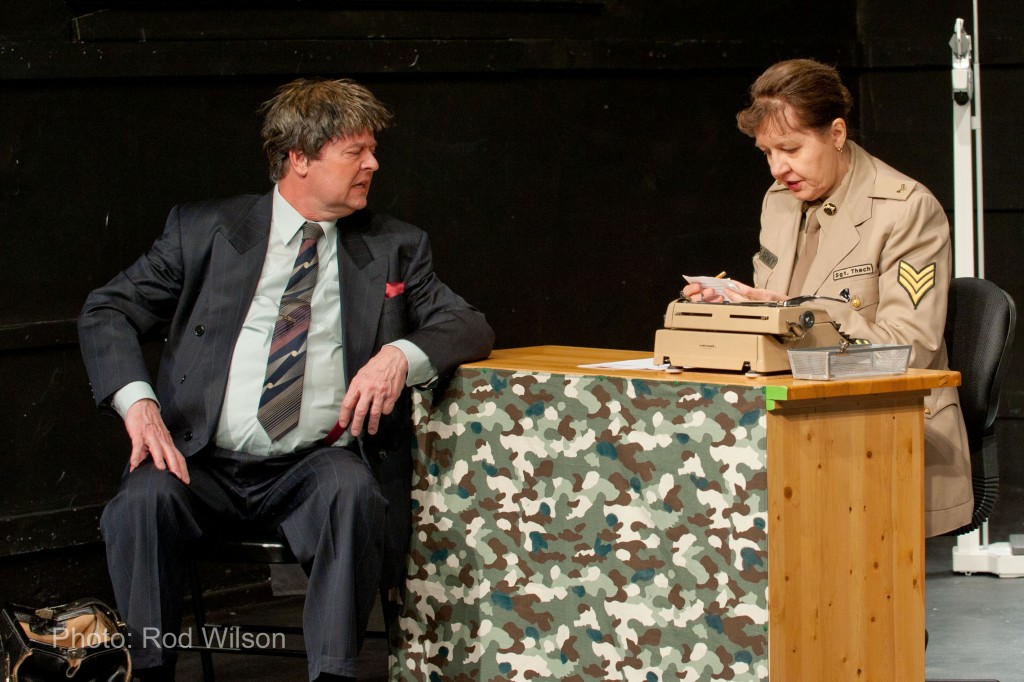 Marion Cheever, played by Peter Schalk, is a man who is unfit, fat and 58 years old. He considers himself unsuitable for any role in the army. His task is to convince the Army Induction Centre examining officer, Sergeant Thech played by Melodie Hull, of his unsuitability. Peter Schalk, in a manner that he does so well, does that in a maniac tour-de-force. Melodie, in contrast, is a solid sea of stern calmness. During the Vietnam war era I am sure the army examiners were exposed to all manners of the absurd behavior by conscripts trying to avoid the draft. This scene reminds me of a scene in the classic cult movie Big Wednesday when all the local surfers, in their efforts to avoid military service, show up as physical and mental head cases. All this in an effort to prove they are unsuitable material to serve in the army. For Marion, in the end, the evidence is overwhelming but once declared unsuitable the outcome is a little unsettling for Marion. He has achieved what he set out to do but he seems to have some trouble accepting the rejection. Here are some images from the play.
Marion Cheever, played by Peter Schalk, is a man who is unfit, fat and 58 years old. He considers himself unsuitable for any role in the army. His task is to convince the Army Induction Centre examining officer, Sergeant Thech played by Melodie Hull, of his unsuitability. Peter Schalk, in a manner that he does so well, does that in a maniac tour-de-force. Melodie, in contrast, is a solid sea of stern calmness. During the Vietnam war era I am sure the army examiners were exposed to all manners of the absurd behavior by conscripts trying to avoid the draft. This scene reminds me of a scene in the classic cult movie Big Wednesday when all the local surfers, in their efforts to avoid military service, show up as physical and mental head cases. All this in an effort to prove they are unsuitable material to serve in the army. For Marion, in the end, the evidence is overwhelming but once declared unsuitable the outcome is a little unsettling for Marion. He has achieved what he set out to do but he seems to have some trouble accepting the rejection. Here are some images from the play.
This play is another good reason to miss a TV hockey game.
@@@@@@@@@@@@@@
The Masons Robbie Burns Celebration, Saturday January 18, 2014 5:30 to 10:30pm at the Cranbrook Anglican Church. Music By Angus MacDonald (fiddle) and Rod Wilson (Irish Bouzouki and Irish Cittern), and M.C. Wally Smith. The following is a brief story offered as entertainment by Rod Wilson, Angus MacDonald and Wally Smith.
A ROBBIE BURNS BUSH DANCE
On the Western plains of New South Wales at this time of year it is hot, hot, hot. Far different from the cooler climes of a traditional Robbie Burns night celebration. Never-the-less, the farmers and their families from miles around travelled to the local school house to celebrate “The Bard”. At this particular Robbie Burns celebration it was no different from the usual and yet……….
Up to this point things had gone well. Glasses had been raised, drinks had been drunk, food had been consumed in copious quantities and the speechifying was over. Trestles, 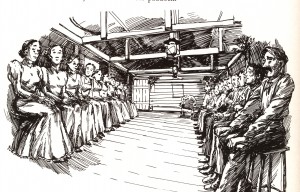 tables and chairs had been pushed to the wall and every body was ready to dance. On stools running end to end along one side of the room sat twenty more or less blooming country girls ranging in ages from fifteen to twenty odd. On the rest of the stools running end to end along the opposite side of the room sat more or less twenty robust lads. But it was evident that something was seriously wrong.
tables and chairs had been pushed to the wall and every body was ready to dance. On stools running end to end along one side of the room sat twenty more or less blooming country girls ranging in ages from fifteen to twenty odd. On the rest of the stools running end to end along the opposite side of the room sat more or less twenty robust lads. But it was evident that something was seriously wrong.
None of the girls spoke above a hushed whisper. None of the men spoke above a hushed oath. Now and then two or three of the men would sidle out into the darkness to vent their frustrations.
‘TAP, TAP, TAP ……..
The rows moved uneasily and some of the girls turned pale faces towards the side door and the mysterious sounds.
‘TAP, TAP, TAP ……..
The tapping came from the kitchen at the rear of the teacher’s residence and was uncomfortably suggestive of a coffin being made: It was also accompanied by a sickly, indescribable odour – more like that of a warm cheap glue than anything else.
In the schoolroom there was a painful scene of strained listening. Whenever one of the men returned from the outside, or put his head inside the door all eyes were fastened on him in a flash forcing him to withdraw. At the sound of a horse’s step all eyes and ears were on the door ’till some one muttered “it is only the horses in the paddock”.
Some of the girl’s eyes began to glisten suspiciously and at last the belle of the evening – a great dark haired pink-and-white Blue Mountain girl, who had been sitting for a full minute staring before her, with blue eyes unnaturally bright, suddenly covered her face with her hands and started to sob. She rose and blindly stumbled from the room, from which she was steered in a hurry by two sympathetic and almost equally upset girl friends. On passing she hysterically sobbed…..
“I can’t help it. I did want to dance. It’s a sh-shame !. I can’t help it. I rode twenty miles and I want to dance.”
A tall strapping young bushman rose, and without disguise, followed her from the room. The rest started to loudly discuss stocks, dogs, horses and other bush things; But above all the chatter rang the voice of the distraught girl. “I can’t help it Jack! I did want to dance. I had such a job getting father and mother to let me come – and – now – …. ” The two girl friends came back into the room and whispered to the school mistress “he sez to leave her to him while he tries to calm her down. ” It’s no use Jack!” came the voice of grief “You don’t know what it is like with father and mother. I, I won’t be able to g-get away – again for – for- not until I’m married perhaps.” The school mistress glanced uneasily along the row of girls – “I’ll take her into my room and get her to lie down and maybe that will calm her.”
A final ‘TAP, TAP, TAP from the kitchen and then a sound like a squawk of a hurt or frightened child. All faces brightened and turned expectantly in the direction of the new sound. And then there came a bang and the sound of “dam” and everybody settled back down in a depressing funk.
Then there came a shout from the darkness and most of the men and some of the girls hurried out to investigate. It sound like the paddock gate rattling and the snort and plod of more horses. “Who is it Tom?” There were voices from the yard yelling “I think it is young Angus MacDonald”. And then were cheers all around because young Angus never travelled anywhere without his fiddle.
Out in the kitchen Wally Smith was still struggling with his button accordion. He had just retrieved the battered and bruised device from the opposite side of the room where, 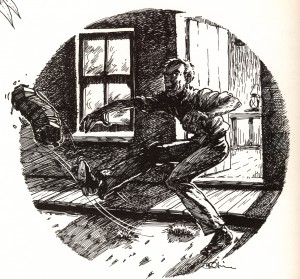 after an hour of struggling to patch the bellows, he had despondently thrown the instrument. Finally he picked it up and headed towards the door and holding it forward between the palms of his hands, as a football is held, he let it drop, and neatly fetched it on to the toe of his riding boot. It was a beautiful kick out into the darkness where upon it was immediately greeted with a yelp of pain as it collided with some one’s head.
after an hour of struggling to patch the bellows, he had despondently thrown the instrument. Finally he picked it up and headed towards the door and holding it forward between the palms of his hands, as a football is held, he let it drop, and neatly fetched it on to the toe of his riding boot. It was a beautiful kick out into the darkness where upon it was immediately greeted with a yelp of pain as it collided with some one’s head.
But from the school room the M.C. yelled “Yes, yes , yes it’s Angus MacDonald with his fiddle. Every body hurry up and take your partners for the first dance ……..”
(In the movie version there would be a joyous scene of dancers flying around the room to the sound of Angus MacDonald’s fiddle belting out a very lively reel and then, in true Hollywood fashion, the scene would fade to black)
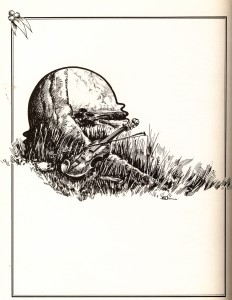 (Stolen and freely adapted from the BushWacker Dance Book (published in 1980) who in turn lifted it from Henry Lawson’s Collection of Short Stories Joe Wilson’s Mates.
(Stolen and freely adapted from the BushWacker Dance Book (published in 1980) who in turn lifted it from Henry Lawson’s Collection of Short Stories Joe Wilson’s Mates.
The original “Maddy” was the English singer Maddy Prior who, along with Sandy Denny, virtually defined the female voice role in the British Folk Rock genre of the 1960s. Sandy Denny may have had the looks and the rock persona but Maddy had the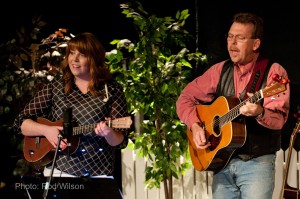 voice. Young local singer Maddy Prinn has a voice that does not suffer from any comparison with either Maddy Prior or Sandy Denny. Miss Prinn, accompanied by her father Dave, made her first appearance at the Local Coffee House on Saturday. It was a stunning performance. She dipped into the recent rock repertoire to sing U2’s With You or Without You, The Dixie Chicks Easy Silence, and, for me two unfamiliar tunes, Sky Scrapper and Love your Memory. Maddy played Ukelele and guitar and, off to one side her father sang harmony and played some really beautiful back up and lead on his vintage Martin D-28. Dave looked so happy I thought he was going to burst. As they say the apple doesn’t fall far from the tree and Maddy sounds like she will continue the Prinn legacy and in all probability out shine her dad. Here are a couple of links worth checking: Maddy Prior singing Gaudette and Sandy Denny singing “Who Knows Where the Time Goes”.
voice. Young local singer Maddy Prinn has a voice that does not suffer from any comparison with either Maddy Prior or Sandy Denny. Miss Prinn, accompanied by her father Dave, made her first appearance at the Local Coffee House on Saturday. It was a stunning performance. She dipped into the recent rock repertoire to sing U2’s With You or Without You, The Dixie Chicks Easy Silence, and, for me two unfamiliar tunes, Sky Scrapper and Love your Memory. Maddy played Ukelele and guitar and, off to one side her father sang harmony and played some really beautiful back up and lead on his vintage Martin D-28. Dave looked so happy I thought he was going to burst. As they say the apple doesn’t fall far from the tree and Maddy sounds like she will continue the Prinn legacy and in all probability out shine her dad. Here are a couple of links worth checking: Maddy Prior singing Gaudette and Sandy Denny singing “Who Knows Where the Time Goes”.
Mark Casey – “a folk singer with attitude” (guitar and vocals) is a big fan of the 60’s British invasion band The Kinks. His special treat for the evening was a collection “Kink” 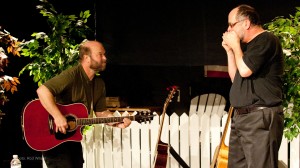 songs. He was joined on a couple of tunes by Barry Coulter on blues “harp”. The other “Mark”, there are many “Marks” around this town, Mark Rosini and his partner Krista
songs. He was joined on a couple of tunes by Barry Coulter on blues “harp”. The other “Mark”, there are many “Marks” around this town, Mark Rosini and his partner Krista 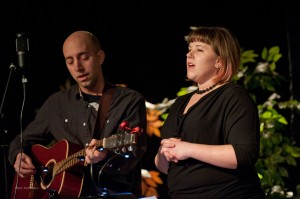 have recently returned to the area and this was their first exposure at Locals. Mark on guitar and vocals backed up Krista on some songs that include Smokey Robinson’s You’ve Got a Hold on Me. “Mr. eclectic” (Barry Coulter) on such diverse instruments as blues harp, guitar, 12 string guitar and amplified dulcimer is a frequent performer on local stages. His special treat for the evening was a full-on “Nic Drake” experience. For those who don’t know Nic Drake “he was an English singer-songwriter and musician known for his acoustic guitar-based songs. He failed to find a wide audience during his lifetime but his work has gradually achieved wider notice and recognition” (from Wikipedia). He suffered from chronic depression and towards the end
have recently returned to the area and this was their first exposure at Locals. Mark on guitar and vocals backed up Krista on some songs that include Smokey Robinson’s You’ve Got a Hold on Me. “Mr. eclectic” (Barry Coulter) on such diverse instruments as blues harp, guitar, 12 string guitar and amplified dulcimer is a frequent performer on local stages. His special treat for the evening was a full-on “Nic Drake” experience. For those who don’t know Nic Drake “he was an English singer-songwriter and musician known for his acoustic guitar-based songs. He failed to find a wide audience during his lifetime but his work has gradually achieved wider notice and recognition” (from Wikipedia). He suffered from chronic depression and towards the end 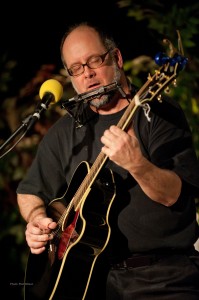 of his life was smoking what has been described as “unbelievable amounts” of marijuana and exhibiting “the first signs of psychosis”. By the winter of 1970, he had isolated himself in London and in 1974 he died from an apparent suicide. The resurgence of interest in his music may be due to the use of Pink Moon in a 1999 VW Cabrio commercial. Drake tended to use open tunings in his guitar music. So, to achieve the full “Nic Drake Experience” Barry has opted to use some of Nic Drake’s tunings such as B E B E B E (alternating 4th and 5ths), E A D F# B E, and C G C F C E (? Csus) and, rather than haul a number of pre-tuned guitars on stage, he felt the experience demanded the full visual and aural sensations of re-tuning the guitar for each song. Barry is not only eclectic he like to be authentic as well. His final piece of the evening was Pink Moon. Darin Welch is a local singer / song writer who runs the
of his life was smoking what has been described as “unbelievable amounts” of marijuana and exhibiting “the first signs of psychosis”. By the winter of 1970, he had isolated himself in London and in 1974 he died from an apparent suicide. The resurgence of interest in his music may be due to the use of Pink Moon in a 1999 VW Cabrio commercial. Drake tended to use open tunings in his guitar music. So, to achieve the full “Nic Drake Experience” Barry has opted to use some of Nic Drake’s tunings such as B E B E B E (alternating 4th and 5ths), E A D F# B E, and C G C F C E (? Csus) and, rather than haul a number of pre-tuned guitars on stage, he felt the experience demanded the full visual and aural sensations of re-tuning the guitar for each song. Barry is not only eclectic he like to be authentic as well. His final piece of the evening was Pink Moon. Darin Welch is a local singer / song writer who runs the 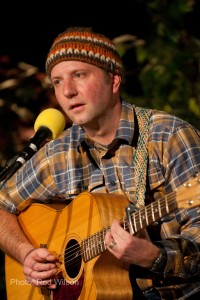 Driftwood Concert House in Kimberley. Darin and his family (Jen and Silas) are dedicated to promoting intimate and sustainable music in a house concert setting. To read reviews and see images from recent Driftwood Concerts do a “Driftwood search” in this blog. He performed three of his original songs that included Wilderness, Pretty Water and Simple City. Darin writes great songs for his own unique voice and his guitar finger picking technique on an outstanding instrument. His performance strength is in his sensitive use of dynamics. RedGirl (Anie and Mike Hepher and Steve Jones) need no introduction. They have been staples on the local music scene for years and during that time they have continued to grow and evolve. Each performance is a fresh look into their musical world. They were joined on guitar by
Driftwood Concert House in Kimberley. Darin and his family (Jen and Silas) are dedicated to promoting intimate and sustainable music in a house concert setting. To read reviews and see images from recent Driftwood Concerts do a “Driftwood search” in this blog. He performed three of his original songs that included Wilderness, Pretty Water and Simple City. Darin writes great songs for his own unique voice and his guitar finger picking technique on an outstanding instrument. His performance strength is in his sensitive use of dynamics. RedGirl (Anie and Mike Hepher and Steve Jones) need no introduction. They have been staples on the local music scene for years and during that time they have continued to grow and evolve. Each performance is a fresh look into their musical world. They were joined on guitar by 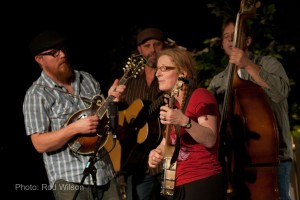 Keith Larsen. Prior to the show they were busy in the “Green Room” pulling together the material for this performance and the result, as usual, was smooth, polished and flawless. For RedGirl there is no other way to perform. For the evening they performed a few bluegrass and “old-timey” tunes (with the emphasis on “old-timey”). Keith was given ample opportunity to display his flat picking talents on Lazy John. Their encore was the old American bluegrass favorite Darli’n Corey.
Keith Larsen. Prior to the show they were busy in the “Green Room” pulling together the material for this performance and the result, as usual, was smooth, polished and flawless. For RedGirl there is no other way to perform. For the evening they performed a few bluegrass and “old-timey” tunes (with the emphasis on “old-timey”). Keith was given ample opportunity to display his flat picking talents on Lazy John. Their encore was the old American bluegrass favorite Darli’n Corey.
Once again the Stage Door was sold out and thanks should go to Lorraine Casey and all the volunteers that make this wonderful institution such a joy. Here are some more images from the evening.
@@@@@@@@@@@@
Treat your self and click on the above link for some of the most amazing foot stomping joyous music you are ever likely to hear. The musicians are Troy MacGillivray on keyboard and fiddle and Tim Edey on button accordion and classical guitar. This is an extended 12 minute set of about eight tunes that includes Silver Spear, Moving Cloud, Road to Errogie, MacArthur Road, Lad Obeirne’s and the great Quebecois tune Mouth of the Tobique (at minute 7:18). This is an amazing set of great tunes, blazing runs, stomping rhythm (just listen to the audience), great variations, instrument switching, and some sly capo repositioning by Tim. These guys are so good that they sound like they are from another planet. The two musicians are obviously having great fun and Tim’s comment mid set “what’s the next hymn Troy” is priceless. This link was passed to me by local fiddle player Angus (‘Gus’) MacDonald. It is from the Cape Breton Celtic Colours Festival that is held every fall in Nova Scotia. ‘Gus’ has been taking fiddle lessons from Troy MacGillivray………….. This is amazing stuff.
@@@@@@@@@@@@